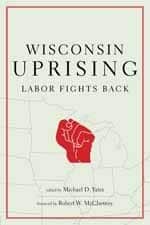Michael D. Yates, ed., Wisconsin Uprising: Labor Fights Back (New York: Monthly Review Press 2012)
Reviewed by MICHAEL STAUCH, Duke University
ON 11 FEBRUARY 2011, newly elected Republican Governor Scott Walker introduced a Budget Repair Bill in the Wisconsin legislature that sought to balance the state budget by eliminating collective bargaining for all public employees except police and firefighters. Workers in both the public and the private sector were outraged. The response began the following Monday, Valentine’s Day, when teaching assistants at the University of Wisconsin planned a rally in defence of the university’s budget. Unexpectedly, thousands of people showed up. Some entered the capitol building to observe the proceedings. As the day progressed, thousands more joined them. When they refused to leave, the occupation began. These events are well known. But contributors to the new essay collection Wisconsin Uprising enrich this story with detailed first-hand accounts, context and analysis from longtime observers of the labour movement, and examples from across the country of how that movement might broaden and deepen the struggle that began anew in Wisconsin. They face the complex task of analyzing a new moment in history from a recent vantage point, and they succeed admirably.
Wisconsin Uprising is divided into three sections. The first, “On the Ground in Madison;’ consists of first~hand accounts of the events in Wisconsin from Connor Donegan and Andrew Sernatinger. Lee Sustar, Dan La Botz and Frank Emspak provide necessary context, including the history of the Wisconsin labour movement and the roots of the recent statewide attack on public workers in previous battles in Milwaukee. This section sets the tone for the book. Throughout, the emphasis is on the actions ordinary people took that gave rise to the movement. We are left in no doubt that the rank-and-file led the struggle from the outset, while union leaders hastened to catch up. Richard Trumka, head of the American Federation of Labor and Congress of Industrial Organizations, said as much in one of the many speeches he gave during the month-long carnival of events in Madison. (147) This section also raises important questions about the limits of business unionism, especially in light of the willingness of many union leaders to channel the movement into electoral campaigns that demoralized people and largely failed to bring about promised changes…

Comments are closed.